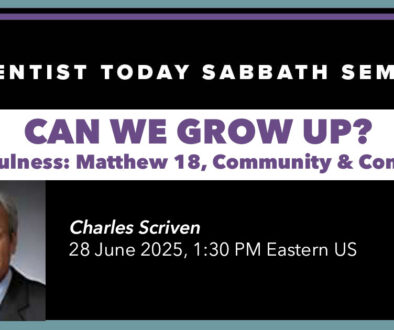ATSS: Martin Weber, “Ministering Shalom”
27 December 2023 |
Chaplains in hospitals, hospices, the military, and law enforcement all have one goal: to facilitate shalom. Such is God’s purpose for us all.
This week for Christmas we celebrated the birth on earth of Jesus, heaven’s “Prince of shalom” (Isaiah 9:6). The true spirit of Christmas goes beyond exchanging gifts with friends—shalom loves enemies, feeds the hungry, visits the lonely and seeks social justice.
Shalom makes us priests on earth—servants of heaven’s sanctuary in collaboration with our great High Priest.
Peace isn’t passive
Shalom is loosely translated “peace” in the Old Testament. Most Christians understand shalom superficially and passively—the absence of negativity, such as strife, guilt, shame, and anger. Actually, its Hebrew meaning has a deeper, richer meaning than peace as we typically envision it.
Shalom in scripture is positive, energetic, and proactive, fulfilling God’s eternal purpose for this planet (and our churches). The goal of heaven’s sanctuary is God’s final remnant sharing shalom throughout the earth like the fragrant ointment of Mary’s devotion to Jesus.
Reviewing all 236 mentions of shalom in the Old Testament moves us beyond a merely personal relationship with God, reaching ever outward to embrace the whole world—even the inanimate environment of His creation.
“Blessed are the peacemakers,” Jesus taught. Scripture reveals seven expanding circles of shalom.
1) Personal shalom with God: Shalom begins in the heart of each believer upon discovering peace in God’s forgiveness and acceptance. Without personally experiencing shalom in Christ, even our doctrine is dysfunctional.
2) Shalom at home: Personal peace with God does no good at home when confined to my prayer closet, worshiping Jesus as my “personal” Savior. Shalom facilitates peace with my family, too.
3) Shalom to the church: Shalom extends beyond a peaceful home to our faith family (even if we understand the Sabbath school lesson differently and have opposing convictions on worship styles).
4) Shalom in the marketplace and classroom: Not satisfied to contain Sabbath blessings within church walls, shalom ripples outward to the marketplace, seeking win-win business dealing. For students, shalom transcends not cheating—perhaps tutoring peers struggling academically.
5) Shalom to the whole world: Shalom reaches out to people unlike ourselves, venturing beyond our affinity groups to strangers of other ethnicities and orientations. Shalom also transcends patriotically singing “God bless America.”
6) Shalom to animals: Shalom in scripture extends beyond humans to the animal world. The patriarch Jacob wished shalom for the flock (see Genesis 37:14). We too should care about God’s nonhuman creatures, not mistreating or exploiting them.
7) Shalom to the environment: Biblical peace includes inanimate creation: “peace for the seed,” so that the land will yield its produce (Zechariah 8:12, literally translated). Creator God is “green” and expects us to be responsible stewards of this world—even as we anticipate the earth made new.
Jesus envisioned all of the above—and nothing less—when He pronounced: “Blessed are the shalom-makers, for they shall be called ‘children of God’” (Matthew 5:9).
Teacher:
Following ordination to professional ministry, Martin Weber pastored the Anaheim church in California, where the mayor sponsored him as chaplain of a business professionals’ group. Next he became a scriptwriter for It Is Written telecast and then an associate editor of Ministry magazine, mentoring pastors globally. While communication director for the Mid-America Union, Weber’s Doctor of Ministry project at a Baptist seminary won a top prize for researching attrition of Adventist pastors’ children. After completing his denominational career, Martin became SDA product manager for Logos Bible Software, and then a hospice and hospital chaplain. Now in retirement, he volunteers as a chaplain for victims of clergy sexual abuse, currently collaborating with attorney Boz Tchividjian, grandson of Billy Graham. Weber’s book God Was There: true stories of a police chaplain, describes subsequent experiences serving 12 law enforcement agencies from local to federal level.
Moderator:
Raj Attiken is a former president of the Ohio Conference, and a teacher at Kettering College.
How to join:
One-click link: https://us06web.zoom.us/j/86765391249
Passcode: ISAIAH
ATSS starting time depends on where you are. If you’re on the west coast of the United States, it’ll be 10:30 AM. On the east coast, 1:30 PM. Times in Europe, Africa, and elsewhere will vary with local time changes. Please double-check the correct time where you live.
The class is intended to last about 2 hours, though the conversation often continues to 4 PM (Eastern time).
About our class:
- The AT Sabbath Seminar is intended to be a courteous forum. We discuss and ask questions politely. We don’t accuse, get angry, put people down, or judge the state of their salvation.
- Stick to the topic in both comments and chat discussion.
- Make your comments and questions short—don’t dominate.
- Keep your microphones muted unless you are called upon to make your comment or ask your question.
- Indicate your interest in speaking by raising your electronic hand—under the “reactions” button.
- Please use your name when you sign in! Not your phone number, not your initials. This will help us differentiate you from unwelcome guests who want to disrupt us. You can set your name after signing on by clicking on the 3 dots next to your picture, which drops down a menu.
We look forward to getting acquainted with you!
YouTube channel:
You can see all of our previous ATSS recordings here.
Coming up:
- Tom deBruin
- Martin Webber
- Laurence Turner
- Andreas Bochman
- Jim Walters




